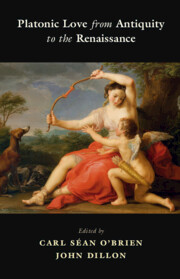Book contents
- Platonic Love from Antiquity to the Renaissance
- Platonic Love from Antiquity to the Renaissance
- Copyright page
- Contents
- Acknowledgements
- Notes on Contributors
- Introduction
- Part I Love in Plato
- Part II Development of Platonic Love in Antiquity
- Part III Love and Metaphysics during the Middle Ages
- Chapter 9 Divine Love and Platonic Beauty in Dionysius the Areopagite
- Chapter 10 Love in the Thought of John Scotus Eriugena
- Chapter 11 Thomas Aquinas on the Connatural, the Supernatural, Love and Charity
- Part IV Platonic Love during the Renaissance
- Bibliography
- Subject Index
- Index Locorum
Chapter 11 - Thomas Aquinas on the Connatural, the Supernatural, Love and Charity
from Part III - Love and Metaphysics during the Middle Ages
Published online by Cambridge University Press: 25 August 2022
- Platonic Love from Antiquity to the Renaissance
- Platonic Love from Antiquity to the Renaissance
- Copyright page
- Contents
- Acknowledgements
- Notes on Contributors
- Introduction
- Part I Love in Plato
- Part II Development of Platonic Love in Antiquity
- Part III Love and Metaphysics during the Middle Ages
- Chapter 9 Divine Love and Platonic Beauty in Dionysius the Areopagite
- Chapter 10 Love in the Thought of John Scotus Eriugena
- Chapter 11 Thomas Aquinas on the Connatural, the Supernatural, Love and Charity
- Part IV Platonic Love during the Renaissance
- Bibliography
- Subject Index
- Index Locorum
Summary
This essay offers an account of Thomas Aquinas’s very complex understanding of love (amor) and related concepts, such as delight (delectatio) and divinely infused charity. It acknowledges the many Platonic influences on Aquinas’s thought in these regards, influences that come to him especially through Augustine of Hippo and Pseudo-Dionysius – both of whom he occasionally criticizes, however, for adhering too closely to Platonic doctrines. Aquinas is intent upon tying all human love in some sense to nature, acknowledging that this entails that in many regards human love is necessitated. To the extent, however, that the rational appetite (the will) is involved, love is not necessitated. The divinely infused virtue of charity brings in further complications, for it is a love that is not natural but comes to a person from above: it is supernatural. And yet it too, according to Aquinas, is not wholly necessitating but affects man in a way that leaves his will free.
Keywords
- Type
- Chapter
- Information
- Platonic Love from Antiquity to the Renaissance , pp. 184 - 198Publisher: Cambridge University PressPrint publication year: 2022

